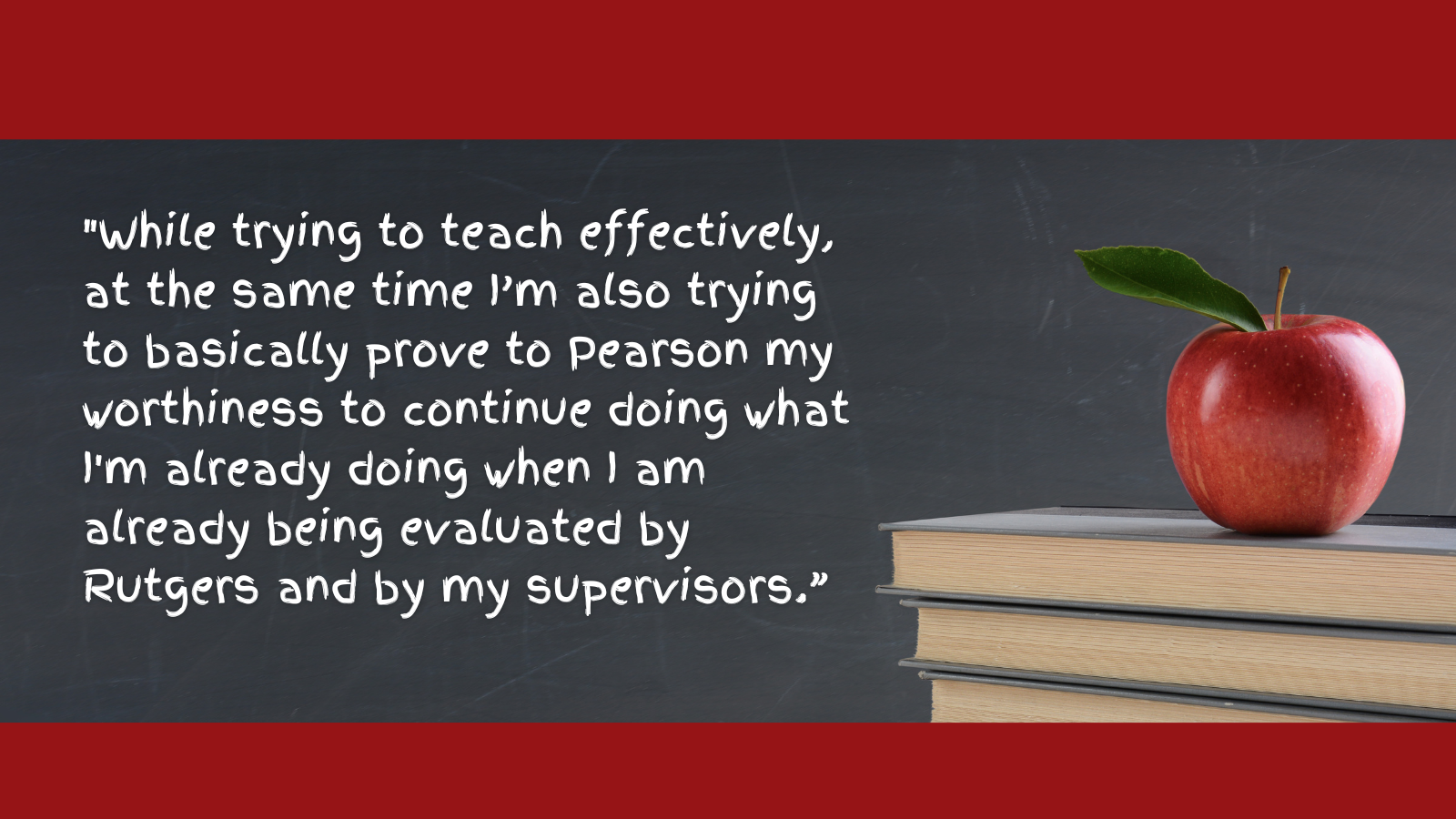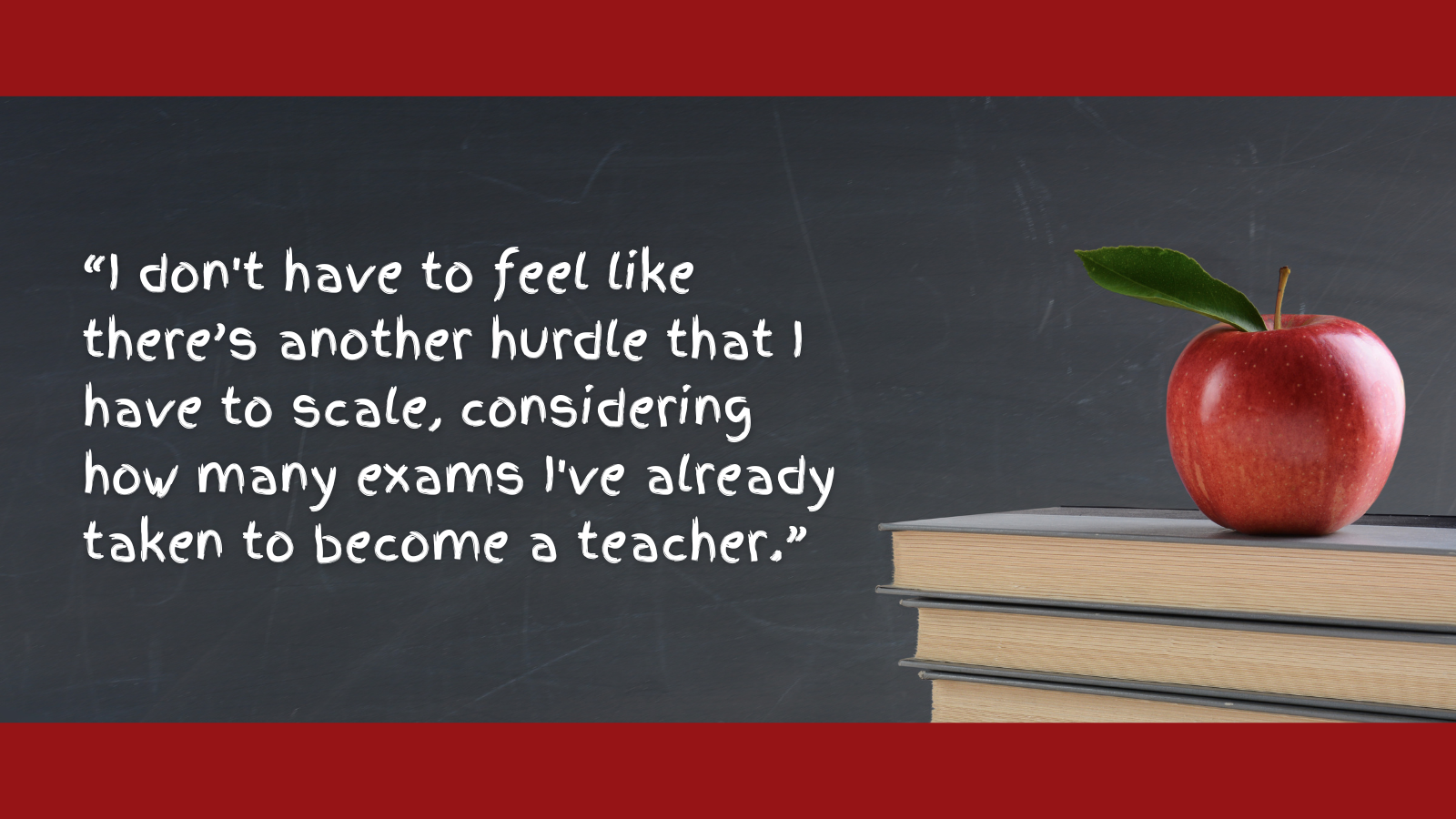NJ Alternate Route Teachers Bid Farewell to edTPA

Stakeholders at various levels of New Jersey's K-12 system are bidding farewell to the edTPA, the Pearson assessment which, since 2017, determined the licensing fate of new teachers seeking entry into the profession. Following the lead of many states, including neighboring New York, the New Jersey legislature voted last spring to eliminate its requirement for new teachers to take and pass the edTPA amid mounting pressure from education advocacy groups and Institutions of Higher Education (IHEs). Universities and colleges represented by the New Jersey Association of Colleges for Teacher Education submitted statements for both Certificate of Eligibility with Advanced Standing (CEAS) and Certificate of Eligibility (CE) programs operated by their IHE members.
Arguments by CE programs, also known as alternate route programs, centered around the unique arrangement through which their nontraditional candidates are hired and trained. Alternate route candidates earn salaried positions as teachers of record in districts following successful interviews and demonstration lessons. They are then observed over two years by their district evaluators using valid and reliable measures under the AchieveNJ system. Additionally, some CE programs perform their own observations of candidates throughout the two-year enrollment period. Using a combination of district and program observations, CE programs can readily produce performance assessment data that addresses candidate effectiveness.
Post-edTPA next steps

A concern for district employers of alternate route candidates was that principals invest two years developing their CE teacher candidates only to face possibly terminating them should the candidate not meet the edTPA cut score even if they demonstrate instructional effectiveness through principal observations. They disagree that a three-hour review of an edTPA portfolio should be more favorably weighted than two-year's worth of evaluations by experienced principals.
Four months after the start of the new school year, the bill became law in December 2022 -- just in time for a winter recess free from the worries of the high-stakes edTPA. While the announcement resulted in welcome relief for many, it also brought about frustration from a lack of clarity about what student teachers and provisional teachers should do. That confusion was quickly remediated with guidance from the New Jersey Department of Education, advising Educator Preparation Programs (EPPs) to plan and submit Temporary Performance Measures that provide alternative evidence of teacher readiness. The range of assessment options varies from district or EPP observations of candidates to locally scored performance assessments and letters of recommendation. Rutgers Alternate Route's proposed plan incorporates a combination of these options.
Second year alternate route candidates are enrolled in the Supervised Provisional Teaching II course, a job-embedded course which reinforces basic teaching skills while also preparing them for state-mandated assessments for standard licensing. During a special office hours session coordinated by the program director and assistant director, candidates shared their reactions to the state’s decision to eliminate the edTPA.
Some candidates attending the sessions expressed feeling conflicted about not submitting the work they completed. Having prepared substantial evidence for the assessment, including the required video recorded lessons, student work samples, and written commentary, they felt confident that they would achieve a passing edTPA score which, for New Jersey varies depending on a candidates’ content area. "Honestly, I’m probably going to submit it," said one candidate who teaches high school math in Hanover Park. Another candidate stated, "But then the other part is well, I'm already doing all this work. I might as well submit my edTPA and just get the score for the state to have it. I don't know. I'm kind of conflicted." Before making her decision, a South Jersey art teacher asked about the benefit. "My main question is, is there any benefit to taking or submitting the edTPA at this point?" Her question most likely stemmed from concerns about reciprocity expressed by the Newark science teacher who asked, "Does this affect the strength of the New Jersey teacher license in terms of reciprocity for other States?" While the candidates raised important questions regarding teacher credentials, Rutgers Alternate Route has not advised candidates either way, allowing them to make decisions about their next steps.
What the teacher candidates think

Several candidates felt the edTPA was unnecessary and that it duplicated the effort of their district supervisors, mentors, and course instructors who evaluate their preparedness to teach through observations and graded assignments. They made statements like, “All these things are preparing us to teach – the course work and my meetings with my year two team members, who are really my informal mentors. They're helping me be a better teacher.”
Comments from an Edison chemistry teacher demonstrate candidate confidence in their districts’ ability to prepare them.
She stated, “I had a lot of help from teachers in my district who have been very supportive of me. I feel like that’s what's most important. You need to have someone that you can actually observe, to see how they teach, and to have interactions with them.”
Another candidate emphasized her mentor’s support in her teacher development, “Through these assignments and through my mentorship in my district I feel like I've been getting prepared.”
The perceived redundancy was also evident in the following candidate’s response.
“I'm a new teacher, and it is my second year. The second year of teaching, I think, is even more crazy than my first year. While trying to teach effectively, at the same time I’m also trying to basically prove to Pearson my worthiness to continue doing what I'm already doing when I am already being evaluated by Rutgers and by my supervisors.”
The assessment’s affiliation with publishing giant Pearson influenced several candidates to question the motivation for the edTPA. A Central Jersey French teacher shared feelings of skepticism:
“I hate to be skeptical, but I feel like it's sort of a money maker, too. And so, you know, sometimes you wonder. Is there an interest in not having you pass a certain part to make some extra money?”
Another teacher pursuing certification for special education felt that the assessment had no relevance to her practice.
“The edTPA was very overwhelming with everything else going on," she said. "I kept questioning why am I doing this if I’m never going to use it."
The chemistry teacher agreed with her, expressing similar concerns, “The assessment just adds to the amount of work you have to do. Plus, I just don't know how it was helpful. I’m in my second-year teaching. Why do I have to think about this?”
Still, there were several teachers who were ready to dig their heels in and tackle the final step required for their standard teaching license. They reflected on coursework in the program and expressed confidence that they would succeed because of their preparedness.
A second-year theatre teacher in the program stated, “We created a lot of the work for the edTPA in year 2 anyway.”
His course colleague employed by Edison School District agreed.
“The assignments from Rutgers really make you think. I find that completing the templates detailing my plans and reflecting on my practice is already very helpful.”
One teacher compared her preparation experience at Rutgers Alternate Route with that of her friends. She commented, “I was really excited for the process Rutgers used to prepare us because I know that my friends who went to school and got their bachelor’s in education felt they did not receive as much support as Rutgers gave us for preparing for edTPA. So, I did feel really blessed in that way that this was really set up for us to succeed.”
A business teacher who offered his opinion agreed.
“I started to realize it was a lot less difficult than I expected,” he stated. “At first, I looked at everything and got immediately overwhelmed. But then throughout the sample assignments in the course, I was like, ‘oh, this isn't so bad!’ I started to get a little more comfortable, but nonetheless, I’m glad I don't have to do it.”
A relief overall

As one might imagine, the number one reaction to the edTPA elimination was relief. No matter how prepared they felt to teach, hearing the announcement of the edTPA elimination in New Jersey was welcome news.
“It's like some sort of a reprieve from the Lord above that we don't have to submit an edTPA,” the theater teacher exuberantly stated.
His Millville course colleague chimed in, “I definitely was not disappointed about it being canceled. It was kind of a relief.”
The French teacher expressed relief that the technical aspects of the assessment were no longer an issue for her.
"I’m glad it's going away," she said. "I hear the upload process is slow and time-consuming. So, I'm just glad that I don't have to worry about any technical issues that I could be facing by putting information into their templates, uploading it, uploading whatever videos, and hoping for the best with the technology. I’m glad it just takes out a step that I felt was just going to be adding more stress during an already busy school year, with everything that's going on.”
Some candidates' relief was tied to knowing there was now extra time they could dedicate to teaching students and giving their best in the classroom.
“I just feel ending the edTPA requirement is really a time saver, considering I’m already feeling so sleep deprived,” explained the chemistry teacher.
The business teacher who had been following the legislative movement of the bill shared his sentiments, stating, “I know it's very time-consuming for us, so I was definitely excited to hear it got eliminated. I know it was on the governor's desk forever just waiting to be signed. So, I was very relieved when it finally became law.”
According to the special education teacher, her packed schedule could not withstand the weight of the edTPA. She expressed her frustration.
“This [the edTPA] was the worst part of the last year and a half," she said. "I'm also going for the special education certifications, so I'm also taking graduate classes on top of doing the edTPA.”
The elimination of the edTPA, according to some candidates, clears a significant bureaucratic hurdle for them. Several candidates used that exact terminology to express their view of the assessment, likening it to a hurdle.
“I’m glad it's not another hurdle that I have to go through, having to wait for my score to be released in order to be teaching in New Jersey,” stated a second-year math teacher.
Another teacher shared a similar comment.
“I don't have to feel like there’s another hurdle that I have to scale, considering how many exams I've already taken to become a teacher.”
Call it what you want – a weight, a hurdle, a barrier, a teacher readiness assessment. The edTPA no longer stands between aspiring New Jersey teachers and the students who need them in classrooms. The profession can hold onto its most precious asset—teachers who love what they do, like the South Jersey art teacher who experienced a renewed love of teaching following the announcement.
She made this compelling statement:
“I loved last year. I was so happy. But my first six months of this school year were kind of miserable because of the edTPA. Then, once we found out we didn’t have to do that, it was really like a weight lifted. That's one of the things that shifted my view back to like, ‘Oh, yeah, I do love this job. This is what I want to do.’”
If you’re considering following your dream of teaching, Rutgers Alternate Route can offer you the support and training you need to succeed. Be sure to follow Rutgers Alternate Route on Twitter or sign up for Alternate Route’s monthly newsletter for more information and stories from the field of education.

 Heather Ngoma has over 25 years of experience collaborating with educators across New Jersey to drive education innovation. She currently serves as the Director of the Rutgers-GSE Alternate Route Program in the Department of Learning and Teaching, a program which helps career changers, recent college graduates, and other aspiring education professionals become licensed teachers in New Jersey. Follow her on Twitter @heatherngoma.
Heather Ngoma has over 25 years of experience collaborating with educators across New Jersey to drive education innovation. She currently serves as the Director of the Rutgers-GSE Alternate Route Program in the Department of Learning and Teaching, a program which helps career changers, recent college graduates, and other aspiring education professionals become licensed teachers in New Jersey. Follow her on Twitter @heatherngoma.





